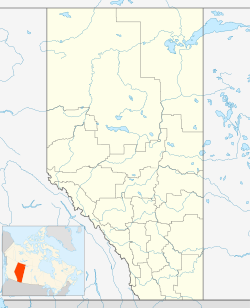Kitscoty, Alberta
| Kitscoty | ||
|---|---|---|
| Village | ||
| Village of Kitscoty | ||

Main Street, Kitscoty
|
||
|
||
| Nickname(s): Biggest Little Sports Centre in Alberta | ||
| Coordinates: 53°20′14″N 110°19′59″W / 53.33722°N 110.33306°WCoordinates: 53°20′14″N 110°19′59″W / 53.33722°N 110.33306°W | ||
| Country |
|
|
| Province |
|
|
| Region | Central Alberta | |
| Census division | 10 | |
| Municipal district | County of Vermilion River | |
| Founded | 1905 | |
| Incorporated | ||
| • Village | March 22, 1911 | |
| Government | ||
| • Mayor | Daryl Frank | |
| • Governing body | Kitscoty Village Council | |
| Area (2016) | ||
| • Land | 1.51 km2 (0.58 sq mi) | |
| Elevation | 670 m (2,200 ft) | |
| Population (2016) | ||
| • Total | 925 | |
| • Density | 610.9/km2 (1,582/sq mi) | |
| • Municipal census (2016) | 976 | |
| Time zone | MST (UTC−7) | |
| • Summer (DST) | MDT (UTC−6) | |
| Highways | Yellowhead Highway | |
| Website | Official website | |
The Village of Kitscoty in Alberta is situated at the junction of Highway 16 (Yellowhead Highway) and Highway 897 (the proposed link to Cold Lake). The village is located approximately midway between Edmonton and Saskatoon (225 km (140 mi) and 295 km (183 mi) respectively). In addition, the village is within short commuting distance of Lloydminster. The CN railway tracks also pass through Kitscoty. The surrounding County of Vermilion River's municipal office is located in Kitscoty.
Kitscoty is located in a prime agricultural area which has much heavy oil activity, both of which provide employment opportunities for the residents.
The first settlers came to the district in 1905, and was incorporated as a Village in 1911. Kitscoty originally served a trading area stretching from Cold Lake in the north to the Battle River in the south. Kitscoty is named after a famous cromlech, 3 large stones in a tripod arrangement, found near a settlement in England known as Kit's Coty House.
In the 2016 Census of Population conducted by Statistics Canada, the Village of Kitscoty recorded a population of 925 living in 317 of its 337 total private dwellings, a 9.3% change from its 2011 population of 846. With a land area of 1.51 km2 (0.58 sq mi), it had a population density of 612.6/km2 (1,586.6/sq mi) in 2016.
...
Wikipedia


